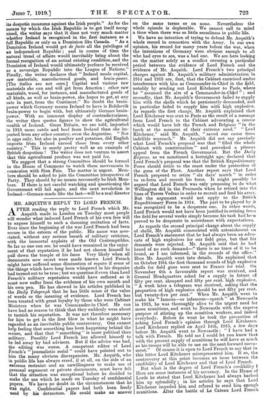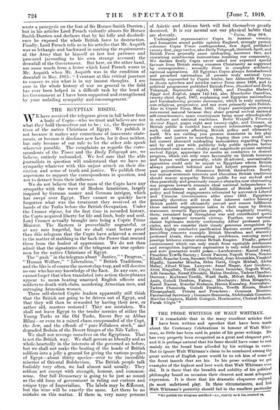MR. ASQUITH'S REPLY TO LORD FRENCH.
AFTER reading the reply to Lord French which Mr. Asquith made in London on Tuesday most people will wonder what induced Lord French of his own free will to expose himself to such a damning recitation of facts. Ever since the beginning of the war Lord'French had been secure in the esteem of the public. His name was asso- ciated, without any serious breath of military criticism, with the immortal exploits of the Old Contemptibles. So far as one can see, he could have remained in the enjoy meat of that reputation if he had not chosen himself to pull down the temple of his fame Very likely when all documents now secret were made known Lord French might have suffered some diminution of repute if some of the things which have long been whispered in his dispraise had turned out to be true ; but we question if even than Lord French's military reputation would have suffered as it must now suffer from the evidence of his own mouth and his own pen. He has showed in his articles published in the Daily Telegraph that he has little sense of the value of words or the meaning of evidence. Lord French has been treated with great loyalty by those who were Cabinet Ministers when he was Commander-in Chief. He can have had no reason to think that they suddenly were about to tarnish his reputation. It was not therefore necessary for him to get in the first blow in what he might have regarded as an inevitable public controversy. One cannot help feeling that something has been happening behind the scenes, and that that " something " is more political than military. Possibly Lord French has allowed himself to be led away by bad advisers. But if the advice was bad, the editing was worse. A competent editor of Lord French's journalistic serial " could have pointed out to him the many obvious discrepancies. Mr. Asquith, who in public life has always erred, if at all, on the side of an extreme restraint and an unwillingness to make use of personal argument or private documents, must have felt that the situation was exceptional before he decided to make the use which he made on Tuesday of confidential papers. We have no doubt in the circumstances that he WAS right. Confidential papers had both been freely used by his detractors. He could make an answer
on the same terms or on none. Nevertheless the whole episode is deplorable. We cannot call to mind a time when there was so little seemliness in public life.
We have no intention of trying to defend Mr. Asquith's whole record in connexion with the Army. In our awn opinion, his record for many years before the war, when the intentions of Germany were obvious enough to all who had eyes to see, was a bad one. We are here looking on the matter solely as a conflict covering a particulat period between the evidence of Lord French and the evidence of Mr. Asquith. Lord French's two principal charges against Mr. Asquith's military administration in 1914 and 1915 are, first, that the Cabinet exercised undue interference with him as Commander-in-Chief in the field, notably by sending out Lord Kitchener to Paris, where he " assumed the airs of a Commander-in-Chief " ; and secondly, that Mr. Asquith's Government failed to supply him with the shells which he persistently demanded, and in particular failed to supply him with high explosive. As regards the first charge, Mr. Asquith explained that Lord Kitchener was sent to Paris as the result of a message from Lord French to the Cabinet •advocating a course which would have left the French and Belgians " in the lurch at the moment of their extreme need." " Lord Kitchener," said Mr. Asquith, " saved our cause from indelible reproach." Mr. Asquith did not say precisely what Lord French's proposal was that " filled the whole Cabinet with consternation " and provoked a piteous appeal from the French Government. But the Daily Express, as we mentioned a fortnight ago, 'declared that Lord French's proposal was that the British Expeditionary Force should retire to the coast under the protection of the guns of the Fleet. Another report says that Lord French proposed to retire " six days' march " in order to re-form and recruit his force. It might possibly 'be argued that Lord French was only proposing to do what Wellington did in the Peninsula when he retired into the lines of Torres Vedras in order to recruit and feed his army. But the argument would not apply to the British Expeditionary Force in 1914. The part to be played by it was recognized to be a desperate one. In other words, Lord French would not have been justified in retiring from the field for several weeks simply because his task had been proved to be desperate in accordance with expectations.
As regards the second principal charge about the supply of shells, Mr. Asquith commented with astonishment on Lord French's statement that he had always been an advo- cate of high explosives for our field guns, but that his demands were rejected. Mr. Asquith said that he had heard of no such demand—" there is no trace of it to be found, so I am informed, in the records of the office." Here Mr. Asquith went into details. He explained that on October 19th the first thousand rounds of high explosive shells for field guns were sent to France for trial. On November 6th a favourable report was received, and General Headquarters asked for a supply in future of fifty per cent. shrapnel and fifty per cent. high explosive. " A week later a telegram was received, asking that the proportion of high explosive should.be not fifty per cent. but twenty-five per cent." When Mr. Asquith went to make his " fammis—or infamous—speech " at Newcastle in 1915, he was thoroughly alive to the urgent need for more munitions, and went to Newcastle with the express purpose of stirring up the munition workers, and indeed everybody. Before he went he took the precaution of asking Lord French's opinion through Lord Kitchener. Lord Kitchener replied on Apra 14th, 1915, a few days before Mr. Asquith went to Newcastle : " I have bad a talk with French. He told me I could let you know that with the present supply of munitions he will have as much as his troops will be able to use on the next forward move- ment." Of course it is open to Lord French to say that in this letter Lord Kitchener misrepresented him. If so, the controversy at this point becomes an issue between the credibility of Lord Kitchener and that of Lord French. But what is the degree of Lord French's credibility ? Here are some instances of his accuracy. In the House of Lords he stated that Lord Kitchener had always backed him up splendidly ; in his articles he says that Lord Kitchener impeded him and refused to send him enough munitions. After the battle of Le Cateau Lord French
wrote a panegyric on the feat of Sir Horace Smith-Dorrien ; but in his articles Lord French violently abuses Sir Horace Smith-Dorrien and declares that by his folly and disobedi- ence he exposed the whole British force to destruction. Finally, Lord French tells us in his articles that Mr. Asquith was so lethargic and backward in meeting the requirements of the Army that he himself at last lost patience and 'procured (according to his own strange account) the downfall of the Government. But here, on the other hand, are some words from a letter which Lord French wrote to Mr. Asquith when Mr. Asquith was in the condition of downfall in May, 1915: " I venture at this critical juncture to convey to you what is in my inmost thoughts. I am sure in the whole history of war no general in the field has ever been helped in a difficult task by the head of his Government as I have been supported and strengthened by your unfailing sympathy and encouragement."



































 Previous page
Previous page